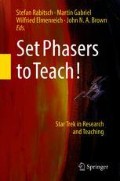Abstract
Science fiction (sf) stories, like other forms of popular culture, are interwoven with the historical moment(s) that produced them. Once we have acquired the reading/viewing protocols that allow us to adjust for the ‘estranging/estranged’ distortions of sf, we recognize more clearly the cultural imprints of the language, images, and values that such stories bear. As popular culture mirrors, they can provide creative access points for ascertaining and understanding the zeitgeist that brought them forth. Both the conception and the first run of Star Trek: The Original Series (1966–1969) provide reflections and refractions of American culture at a time when it witnessed major international transitions and domestic upheaval. Bearing a recognizable imprint of the post-war optimism and confidence in scientific progress, Star Trek’s premise of telling modern morality plays gives us access to that which Americans were hopeful and/or concerned about. Star Trek was also minted with the American self-image of being the protector and defender of the western world, its values and its achievements. By viewing John F. Kennedy’s presidency vis-à-vis Star Trek, we will see how the US, as a self-styled conqueror of a continent, began to integrate the ‘benevolent’ mission of its ideological predecessor, the British Empire, into its own national mythos.

Access this chapter
Tax calculation will be finalised at checkout
Purchases are for personal use only
Notes
- 1.
Castle Bravo refers to the most powerful nuclear detonation test ever conducted by the United States. Initially classified, the unexpected strength of the detonation and the subsequent fallout over a large area in the Pacific sparked international concern and controversy.
- 2.
Wagon Train (1957–1965) was a popular television Western with a distinctive semi-anthological format. Its proto-ensemble cast found themselves in a new location each week, telling semi-allegorical stories about a broad range of contemporary issues.
- 3.
‘Hornblower’ refers to a series of eleven novels, an unfinished novel and a few short stories by British author Cecil Scott Forester. They chronicle the rise of the eponymous hero, a fictional Royal Navy officer during the heyday of the Age of Sail at the end of the eighteenth and the beginning of the nineteenth century. Published between 1937 and 1962, the Hornblower saga enjoyed great popularity in the US during and after the Second World War.
Works Cited
Hamer R (Writer), Penvey J (Director) (1967) A Taste of Armageddon [Television series episode]. In: Roddenberry G (Executive Producer) Star Trek: The Original Series. NBC, Los Angeles
Wolfe L (Writer), Lucas J (Director) (1968) The Ultimate Computer [Television series episode]. In: Roddenberry G (Executive Producer) Star Trek: The Original Series. NBC, Los Angeles
Crucis J (Writer), Daniels M (Director) (1968) A Private Little War [Television series episode]. In: Roddenberry G (Executive Producer) Star Trek: The Original Series. NBC, Los Angeles
Cronin L (Writer), Taylor J (Director) (1969) Let That Be Your Last Battlefield [Television series episode]. In: Roddenberry G (Executive Producer) Star Trek: The Original Series. NBC, Los Angeles
Richards M, Heinemann A (Writers), Alexander D (Director) (1969) The Way to Eden [Television series episode]. In: Roddenberry G (Executive Producer) Star Trek: The Original Series. NBC, Los Angeles
Slavin G, Adams S (Writers), Taylor J (Director) (1969) The Mark of Gideon [Television series episode]. In: Roddenberry G (Executive Producer) Star Trek: The Original Series. NBC, Los Angeles
Kennedy JF (1960) Acceptance speech for the democratic party nomination of the presidency of the United States. Retrieved from: http://www.jfklibrary.org/Asset-Viewer/AS08q5oYz0SFUZg9uOi4iw.aspx
Rabitsch S (2016) “And yet, everything we do is usually based on the English”: sailing the mare incognitum of Star Trek’s transatlantic double consciousness with Horatio Hornblower. Sci Fict Film Telev 9(3):439–472. https://doi.org/10.3828/sfftv.2016.9.14
Hellmann J (1997) The Kennedy obsession: the American myth of JKF. Columbia UP, New York
Taves B (1993) The romance of adventure: the genre of historical adventure movies. University Press of Mississippi, Jackson
Kennedy JF (1961) Inaugural address. Retrieved from: http://www.jfklibrary.org/Research/Research-Aids/Ready-Reference/JFK-Quotations/Inaugural-Address.aspx
Bennett H (Producer), Nimoy L (Director) (1986) Star Trek IV: The Voyage Home [Motion picture]. Paramount Pictures, Los Angeles
Jaffe S, Winter R (Producers), Meyer N (Director) (1991) Star Trek VI: The Undiscovered Country [Motion picture]. Paramount Pictures, Los Angeles
Snodgrass M (Writer), Beaumont G (Director) (1990) The High Ground [Television series episode]. In: Berman R (Executive Producer) Star Trek: The Next Generation. Syndication, Los Angeles
Biller K, Fuller B (Writers), Kroeker A (Director) (2001) Workforce [Television series episode]. In: Berman R (Executive Producer) Star Trek: Voyager. UPN, Los Angeles
Recommended Reading
Geraghty L (2007) Living with Star Trek: American culture and the Star Trek universe. I.B. Tauris, New York
Gregory C (2000) Star Trek parallel narratives. Macmillan, London
Halliwell M (2007) American culture in the 1950s. Edinburgh UP, Edinburgh
Johnson-Smith J (2005) American science fiction TV: Star Trek, stargate and beyond. I.B. Tauris, New York
Kapell M (ed) (2010) Star Trek as myth: essays on symbol and archetype at the final frontier. McFarland, Jefferson
Monteith S (2008) American culture in the 1960s. Edinburgh UP, Edinburgh
Reagin NR (ed) (2013) Star Trek and history. John Wiley, New York
Rorabaugh W (2002) Kennedy and the promise of the sixties. CUP, Cambridge
Author information
Authors and Affiliations
Corresponding author
Editor information
Editors and Affiliations
Rights and permissions
Copyright information
© 2018 Springer International Publishing AG, part of Springer Nature
About this chapter
Cite this chapter
Rabitsch, S. (2018). “Wagon Wheels, Sails, and Warp Cores”: Star Trek and American Culture: Between Allegory and Worldbuilding. In: Rabitsch, S., Gabriel, M., Elmenreich, W., Brown, J. (eds) Set Phasers to Teach!. Springer, Cham. https://doi.org/10.1007/978-3-319-73776-8_3
Download citation
DOI: https://doi.org/10.1007/978-3-319-73776-8_3
Published:
Publisher Name: Springer, Cham
Print ISBN: 978-3-319-73775-1
Online ISBN: 978-3-319-73776-8
eBook Packages: Computer ScienceComputer Science (R0)

